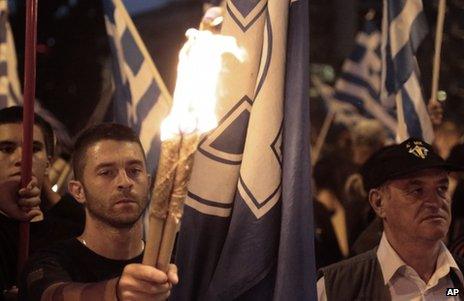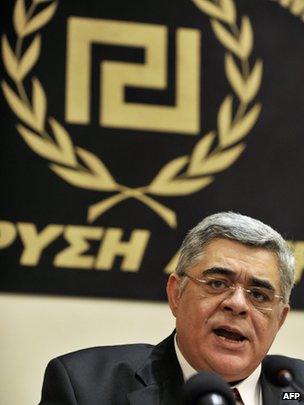Profile: Greece's far-right Golden Dawn party
- Published

Golden Dawn supporters are seen here at a rally in Athens in May
Loathed and feared by many as neo-Nazis, Greece's Golden Dawn party has nevertheless gained substantial support during the economic crisis.
As recently as the October 2009 election, held just before the country's credit rating was downgraded, it was winning less than 1% of the vote and had no representation in parliament.
Then, after two international bailouts and a government austerity drive, it won 7% in 2012's twin elections, ending up in fifth place with 18 seats in parliament.
It took advantage of growing public anger fuelled by corruption and mismanagement by the established political parties; drastic cuts to jobs, wages and pensions enforced by international lenders; and a steady flow of immigrants seeking access to the EU.
Outside parliament, its members sought to drum up support through programmes such as food hand-outs to the poor, which pointedly excluded immigrants.
Its leaders declared ordinary Greeks under attack. MP Ilias Panagiotaros told the BBC: "Greek people have to protect themselves.

Nikolaos Michaloliakos is seen here at a news conference in Athens last year
"Greek society is ready... [for] a new type of civil war. On one side will be nationalists like us, and Greeks who want our country to be as it used to be. On the other will be illegal immigrants and anarchists."
Members were accused of perpetrating attacks on foreigners and political opponents, culminating in the killing of left-wing rapper Pavlos Fyssas in September 2013.
The investigation into that crime has resulted in a clampdown on the party and the arrest of its leadership on charges of belonging to a criminal organisation.
Junta inspiration
The movement which would become Golden Dawn was founded in 1980 by former commando Nikolaos Michaloliakos, its current leader and one of those under arrest.
It emerged out of a vein of far-right extremism in Greece which dates back to strongman Prime Minister Ioannis Metaxas in the 1930s, Greek journalist Nick Malkoutzis writes in an article on the party's place in Greek politics, external.
According to a profile of the party in Greece's centre-left daily Ta Nea, Mr Michaloliakos organised the party "along military lines, with him as leader, as the supreme authority".
He apparently took his inspiration from leaders of the 1967-74 Greek junta, whom he reportedly met while serving prison sentences in the 1970s for paramilitary activities.
Golden Dawn MP Ilias Panagiotaros: "We are in civil war"
Golden Dawn may officially deny being a neo-Nazi movement but its badge resembles a swastika and some of its senior members have praised Adolf Hitler.
Mr Michaloliakos himself has denied the existence of gas chambers and crematoria at the site of the Auschwitz death camp.
The party's political breakthrough came when Mr Michaloliakos won a seat on Athens city council in 2010.
It fought the 2012 general elections on a twin platform: opposition to immigration and condemnation of the bailouts.
As far back as the 1990s, Golden Dawn members were suspected of street attacks on foreigners, as well as leftists, according to a profile by another Greek newspaper, Kathimerini, external.
Golden Dawn spokesman Ilias Kasidiaris was apparently provoked when his alleged involvement in an armed robbery was mentioned
Last year, most of the 154 recorded racist attacks in Greece were attributed to Golden Dawn members, as were most of the 104 registered so far this year. The killing of two immigrants was also linked to the party.
One of the MPs now in custody, party spokesman Ilias Kasidiaris, caused outrage last year when he attacked two female left-wing politicians during a live TV debate, slapping one and throwing water over another.
The party was also blamed for an attack on Communist Party members last month, in which nine people are said to have been injured.
However, it appears to have taken the killing of Fyssas, a hip hop performer who rapped against racism, to persuade the Greek authorities to take action against the party.
Political vacuum?
The government believes the killing has revealed a direct chain of command to the party leadership, providing the basis for Golden Dawn to be classified as a criminal group.
Other charges against some of the 22 people arrested include murder, assault and money-laundering. After raiding the home of Mr Michaloliakos, police said they had found three pistols, ammunition and thousands of euros in cash.
The BBC's Mark Lowen in Athens says the government's actions against Golden Dawn are "unprecedented"
Whether or not Golden Dawn now collapses under the weight of the criminal inquiry, the fact remains that nearly half a million Greeks gave it their vote last year.
In his analysis of the party's position, Malkoutzis argues that mainstream parties such as New Democracy, the conservative party which dominates Greece's coalition, are to blame for having allowed the far-right to flourish. He also attacks "compliant" Greek media.
New Democracy is not averse to using anti-immigrant rhetoric itself, the journalist points out, with calls to "reclaim" Greece's cities for Greeks.
The problems Golden Dawn exploited have not gone away. For one thing, Greece remains "the major gateway of undocumented migrants and asylum seekers from Africa and Asia", according to the International Organization for Migration, external.
Meanwhile, further painful economic reforms are looming, the jobless rate keeps rising and there is no sign of economic growth.
And as Malkoutzis points out, Nikolaos Michaloliakos is no stranger to prison. "The threat to democracy will not disappear so easily," he concludes.